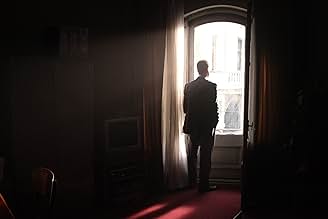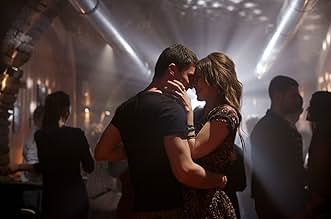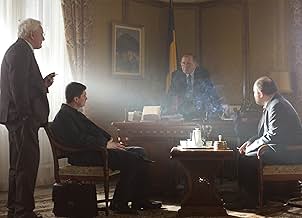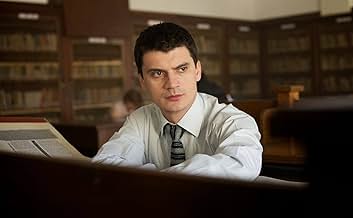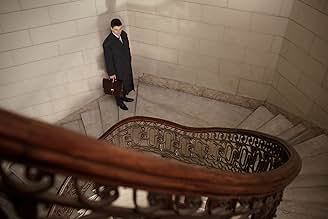De ce eu?
- 2015
- 2h 5min
CALIFICACIÓN DE IMDb
7.5/10
2.8 k
TU CALIFICACIÓN
Cristian, un joven fiscal idealista cuya carrera va en aumento, intenta abrir una causa contra un colega de edad avanzada acusado de corrupción.Cristian, un joven fiscal idealista cuya carrera va en aumento, intenta abrir una causa contra un colega de edad avanzada acusado de corrupción.Cristian, un joven fiscal idealista cuya carrera va en aumento, intenta abrir una causa contra un colega de edad avanzada acusado de corrupción.
- Dirección
- Guionistas
- Elenco
- Premios
- 12 nominaciones en total
Virgil Ogãsanu
- Procurorul General al Romaniei, Iovitu
- (as Virgil Ogasanu)
Barna Bányai Kelemen
- Lajos Molnar
- (as Banyai Kelemen Barna)
George Remes
- Ovidiu Florea
- (as Remes George)
- Dirección
- Guionistas
- Todo el elenco y el equipo
- Producción, taquilla y más en IMDbPro
Opiniones destacadas
There is no doubt to me that the film is very well informed on what surrounded the real-life case of Cristian Panait and Alexandru Lele. The former, a young prosecutor in Bucharest, was pressured to initiate the criminal prosecution of the latter, a local prosecutor in Oradea. Lele had ordered the arrest of the son of a local party bigwig, on charges of being involved in a petrol smuggling ring. The political ramifications of the case were immense at the time, in an era that can arguably be identified as the worst for the rule of law in post-communist Romania, especially in relation to the complexity of the criminal/political machinations.
Tudor Giurgiu and Loredana Novak adapted this story into the semi-fictional "Why Me?". In doing so, they kept the core themes of corruption, political webs of interest and individual persecution, and molded them to fit a traditional narrative structure. What came out was the tragic story of Panait, here renamed Panduru, who is cornered into losing his mind while passing through cinematic stereotypes of political thrillers, rather than exploring the deeper roots of his anxieties. This leads to the crux of its undoing, creating a believable scenario where Panduru goes from self-confident to self-destructive within a time frame of a couple of weeks.
That is not to say that the movie is without merit. At times, it is a powerful indictment of powerlessness in the face of systemic corruption, as it effectively portrays the bullish hierarchical relationships that arise in certain bureaucracies. But as it focuses on Panduru, it has a hard time delivering an empathetic character - instead, we are served with Emilian Oprea's stiff and robotic interpretation, which occasionally engages, but never emotes. Moreover, Giurgiu employs several stereotypes and tropes you would expect from a Hollywood screenwriter/director, as lurid sex scenes of no obvious relevance and pointless mistresses spice up some unimaginative camera pans and shots, including the already classic downwards looking spiral staircase, which is complemented here with repeated battery removal procedures from some old school Nokia phones.
Perhaps I am being overly harsh, because it all comes together in a compact, competent, if rather undisciplined manner. But it is unusual to see Romanian films failing to be authentic in dialogue or setting, as what should be 2002 rarely feels farther away than 2015, while the bullishness doesn't have the expected bite. When it actually does work, like in the repeated use of the utterly condescending and demeaning expression of "boy", generally used by superiors in conversation with Panduru, you do feel the weight of the world on his shoulders, right there. It's just that the film lacks the fascinating depth that a proper analysis of the facts would have allowed.
Tudor Giurgiu and Loredana Novak adapted this story into the semi-fictional "Why Me?". In doing so, they kept the core themes of corruption, political webs of interest and individual persecution, and molded them to fit a traditional narrative structure. What came out was the tragic story of Panait, here renamed Panduru, who is cornered into losing his mind while passing through cinematic stereotypes of political thrillers, rather than exploring the deeper roots of his anxieties. This leads to the crux of its undoing, creating a believable scenario where Panduru goes from self-confident to self-destructive within a time frame of a couple of weeks.
That is not to say that the movie is without merit. At times, it is a powerful indictment of powerlessness in the face of systemic corruption, as it effectively portrays the bullish hierarchical relationships that arise in certain bureaucracies. But as it focuses on Panduru, it has a hard time delivering an empathetic character - instead, we are served with Emilian Oprea's stiff and robotic interpretation, which occasionally engages, but never emotes. Moreover, Giurgiu employs several stereotypes and tropes you would expect from a Hollywood screenwriter/director, as lurid sex scenes of no obvious relevance and pointless mistresses spice up some unimaginative camera pans and shots, including the already classic downwards looking spiral staircase, which is complemented here with repeated battery removal procedures from some old school Nokia phones.
Perhaps I am being overly harsh, because it all comes together in a compact, competent, if rather undisciplined manner. But it is unusual to see Romanian films failing to be authentic in dialogue or setting, as what should be 2002 rarely feels farther away than 2015, while the bullishness doesn't have the expected bite. When it actually does work, like in the repeated use of the utterly condescending and demeaning expression of "boy", generally used by superiors in conversation with Panduru, you do feel the weight of the world on his shoulders, right there. It's just that the film lacks the fascinating depth that a proper analysis of the facts would have allowed.
''De ce eu?'' is a Romanian political thriller, starring Emilian Oprea as Cristian Panduru, a young and honest prosecutor who is in charge of an investigation which is in the spotlight of the nation's media and concerns a corrupt (?) older prosecutor accused of a variety of professional misconducts. The movie portrays a deeply unethical, untrustworthy political and judicial system with shady officials reigning over Romanian people, a situation too familiar for the European southern countries such as Greece or Italy. In the midst of this nefarious system, Cristian struggles to remain faithful to his oath and when he realizes that the man he is supposed to prosecute is in fact innocent, a descent into paranoia and madness begins for him. The consequences of his bold actions, defying his superiors orders, finally lead to his suspension. After that, Cristian delves fast to the poisonous world of paranoia with a tragic conclusion.
This is a well-shot film with nice performances from the main protagonists, having a tight plot which reveals to the viewer the level of corruption in the Romanian political system. This is further supported by the great dialogue of the movie, making the characters and situations plausible, while achieving a high level of realism, a necessary ingredient for the genre's films. ''De ce eu?'' is a rather sad and gloomy story of a man attempting to stand up to the crooked system and finally losing the battle. The finale is pessimistic and mournful, leaving a bitter aftertaste to the viewer. So, if you are looking for a movie with happy ending, better skip it. In the film's universe there is no chance of redemption and the fate of the rebel is his demise.
''De ce eu?'' will appeal more to the fans of European movies of the genre, tired of Hollywood action-packed, plotless pictures.
My more precise rating would be closer to 7.5./10.
I think Romanian cinema would benefit from depicting more movies about professional, normal people rather than dysfunctional ones.
In some sense, probably cinema is also a mirror of society. Since "corruption" is a subject nowadays in Romania, "Why me?" approaches this subject.
I think the movie describes pertinently the influence of the superiors on the prosecutor, their attitude of bullying into getting what they wanted-a mock up trial on other prosecutor so that their material interests would survive, the harassment he is subject to. The question is what to do-to acquiesce or to stand ground? A similar moral dilemma has the policeman in the movie "Police,adjective" and similar harassment suffers "Serpico" .
However the movie lacks on two points: 1) it does not show the descent or turmoil of the protagonist which usually accompany up to the final act. He is mostly calm or self-assured up to the end, in contrast with the tragedy of his final act.
2) it does not show what is the origin of his moral conscience. Was it influence of some people, did it come from his own study and reflections? Also, what principles does he support?
In some sense, probably cinema is also a mirror of society. Since "corruption" is a subject nowadays in Romania, "Why me?" approaches this subject.
I think the movie describes pertinently the influence of the superiors on the prosecutor, their attitude of bullying into getting what they wanted-a mock up trial on other prosecutor so that their material interests would survive, the harassment he is subject to. The question is what to do-to acquiesce or to stand ground? A similar moral dilemma has the policeman in the movie "Police,adjective" and similar harassment suffers "Serpico" .
However the movie lacks on two points: 1) it does not show the descent or turmoil of the protagonist which usually accompany up to the final act. He is mostly calm or self-assured up to the end, in contrast with the tragedy of his final act.
2) it does not show what is the origin of his moral conscience. Was it influence of some people, did it come from his own study and reflections? Also, what principles does he support?
Based on a genuine true story, the facts presented are true and sadly the battle against corruption is still very much alive to this day.
I've just watched this fine example of a gritty Noir at Berlinale. I'm a lousy movie critic, but just to give you an idea: think "Chinatown", minus the sun-drenched California landscape. The protagonist has to fight various factions, and gets to feel like being but a pawn in a game bigger than him. The setting is Romania, in 2002, it is gritty, dark, and pretty gray, for the most part. Quite atmospheric, and realistic - chillingly so, as a lot of the plot was informed by real events, as the director confirmed during a Q&A after the viewing. The cinematography and color palette is just right for the occasion, the camera is often close to the characters. The actors do a fine job in my book. I recommend this movie, and I'm curious to see what it'll stir up in Romania once it is released there.
¿Sabías que…?
- TriviaThe movie was inspired by true events.
Selecciones populares
Inicia sesión para calificar y agrega a la lista de videos para obtener recomendaciones personalizadas
- How long is Why Me??Con tecnología de Alexa
Detalles
- Fecha de lanzamiento
- Países de origen
- Sitio oficial
- Idiomas
- También se conoce como
- Why Me?
- Locaciones de filmación
- Productoras
- Ver más créditos de la compañía en IMDbPro
Taquilla
- Presupuesto
- EUR 1,200,000 (estimado)
- Tiempo de ejecución2 horas 5 minutos
- Color
- Relación de aspecto
- 2.39 : 1
Contribuir a esta página
Sugiere una edición o agrega el contenido que falta


